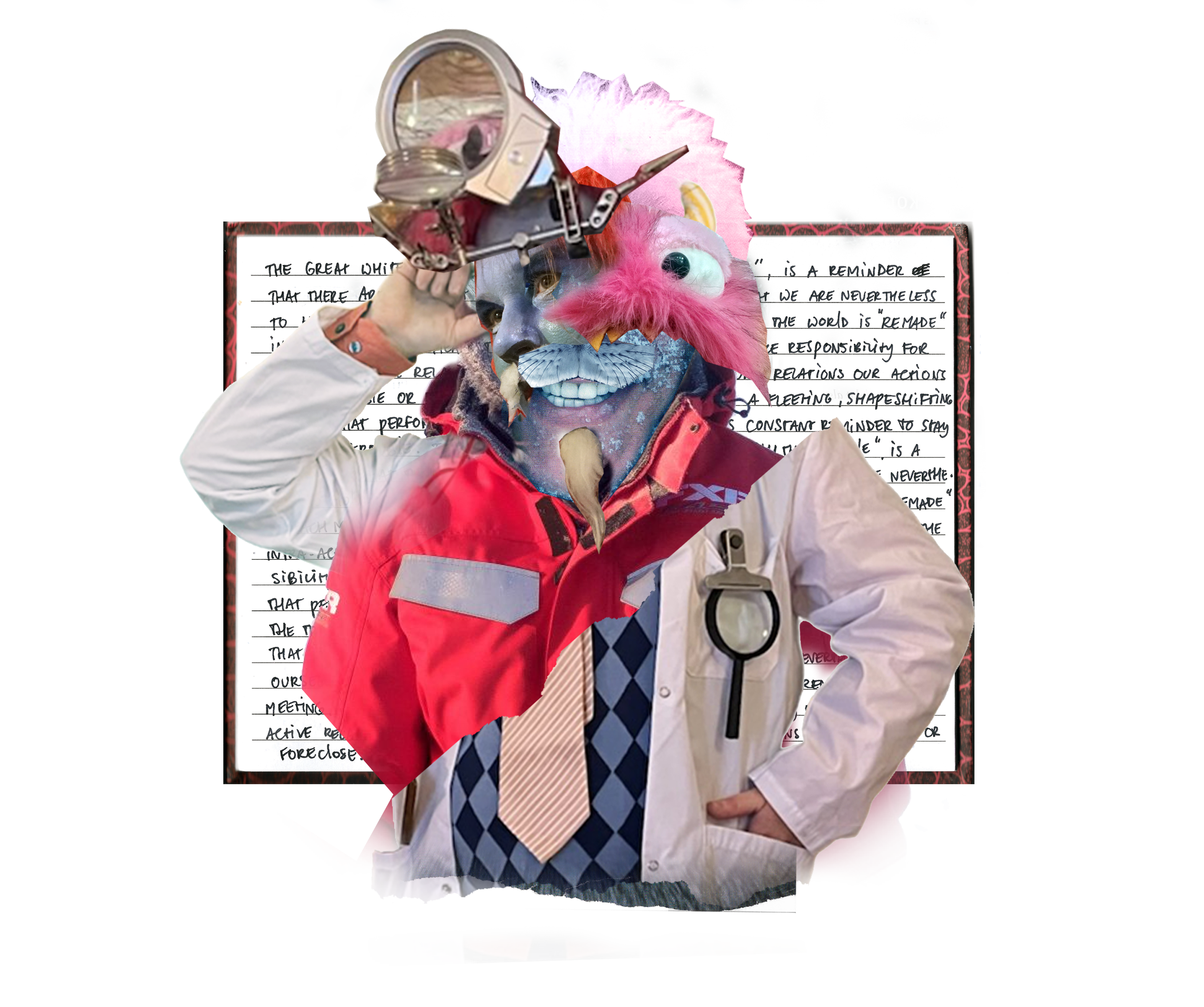Politics of recognition: Difference between revisions
No edit summary |
No edit summary |
||
| Line 3: | Line 3: | ||
You have encountered a “Great White Beast” | You have encountered a “Great White Beast”, a fleeting, shapeshifting figure that performs the world as indeterminate. The possibilities of encountering a Great White Beast is a reminder that there are no right decisions to be made, but that we are nevertheless to hold ourselves accountable to our own choices. | ||
The Gjoa Haven HTA seeks recognition for the impacts that their community has suffered from the impacts of polar bear harvest quota reductions | The Gjoa Haven HTA seeks recognition for the impacts that their community has suffered from the impacts of polar bear harvest quota reductions, and one of the ways in which they expect to gain such recognition is through the publication of an academic article. | ||
But what does it mean for scientists to generate “recognition” through academic publishing, if they are themselves part of the hegemonic institutes that are enabled to bestow, or withhold, such recognition? Some of the expressed frustrations by Gjoa Haven community members directly involve researchers and western science. Glen Coulthard, referring to such contradictions, critiques ‘recognition’ as a promise ‘to reproduce the very configurations of colonial power that Indigenous demands for recognition have historically sought to transcend’ (Coulthard, 2007, p. 437). | |||
So what can you do? | |||
Aware of these tensions that are connected to the expressed desires of Gjoa Haven’s HTA for recognition, while also seeking to be responsive towards Gjoa Haven’s needs, I have not tried to seek and resolve this trouble. We, three of the BearWatch Principle investigators and I, have rather leaned into such tensions, by (re)negotiating our positions as implicated subjects, and find responsive approaches to “share” Gjoa Haven’s experiences. | Aware of these tensions that are connected to the expressed desires of Gjoa Haven’s HTA for recognition, while also seeking to be responsive towards Gjoa Haven’s needs, I have not tried to seek and resolve this trouble. We, three of the BearWatch Principle investigators and I, have rather leaned into such tensions, by (re)negotiating our positions as implicated subjects, and find responsive approaches to “share” Gjoa Haven’s experiences. | ||
To prepare for such conversations with the HTA on appropriate ways to engage with their testimonies, you should take a detour to another cut, and have better look at what happened during the Workshops in Summer, 2019, if you haven’t done so yet. Alternatively, you could check out a nearby Wrecksite: Science based conservation to find out more about the larger apparatus that our actions challenge, or tend towards. | To prepare for such conversations with the HTA on appropriate ways to engage with their testimonies, you should take a detour to another cut, and have better look at what happened during the Workshops in Summer, 2019, if you haven’t done so yet. Alternatively, you could check out a nearby Wrecksite: Science based conservation to find out more about the larger apparatus that our actions challenge, or tend towards. | ||
Revision as of 00:36, 12 January 2025

You have encountered a “Great White Beast”, a fleeting, shapeshifting figure that performs the world as indeterminate. The possibilities of encountering a Great White Beast is a reminder that there are no right decisions to be made, but that we are nevertheless to hold ourselves accountable to our own choices.
The Gjoa Haven HTA seeks recognition for the impacts that their community has suffered from the impacts of polar bear harvest quota reductions, and one of the ways in which they expect to gain such recognition is through the publication of an academic article.
But what does it mean for scientists to generate “recognition” through academic publishing, if they are themselves part of the hegemonic institutes that are enabled to bestow, or withhold, such recognition? Some of the expressed frustrations by Gjoa Haven community members directly involve researchers and western science. Glen Coulthard, referring to such contradictions, critiques ‘recognition’ as a promise ‘to reproduce the very configurations of colonial power that Indigenous demands for recognition have historically sought to transcend’ (Coulthard, 2007, p. 437).
So what can you do?
Aware of these tensions that are connected to the expressed desires of Gjoa Haven’s HTA for recognition, while also seeking to be responsive towards Gjoa Haven’s needs, I have not tried to seek and resolve this trouble. We, three of the BearWatch Principle investigators and I, have rather leaned into such tensions, by (re)negotiating our positions as implicated subjects, and find responsive approaches to “share” Gjoa Haven’s experiences.
To prepare for such conversations with the HTA on appropriate ways to engage with their testimonies, you should take a detour to another cut, and have better look at what happened during the Workshops in Summer, 2019, if you haven’t done so yet. Alternatively, you could check out a nearby Wrecksite: Science based conservation to find out more about the larger apparatus that our actions challenge, or tend towards.
